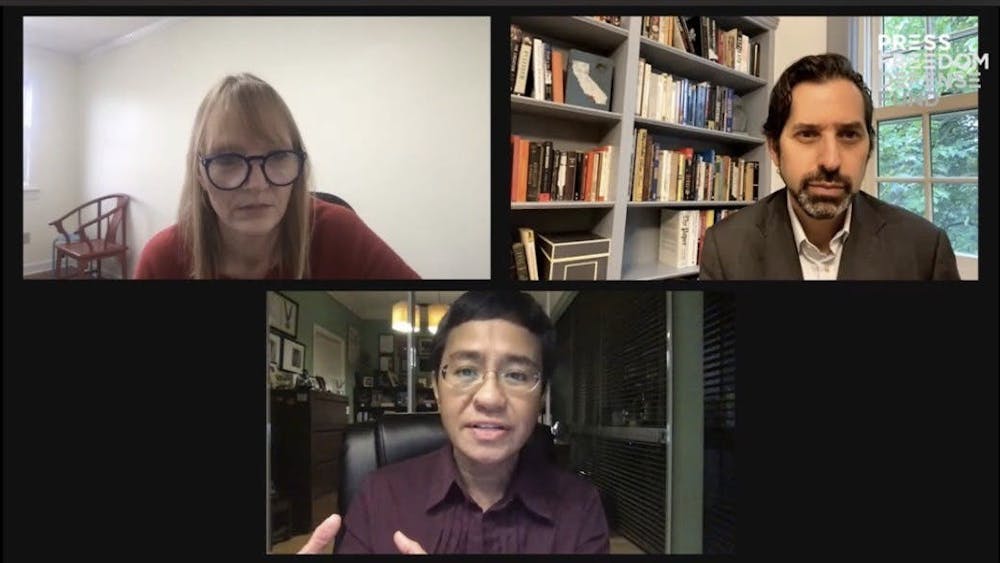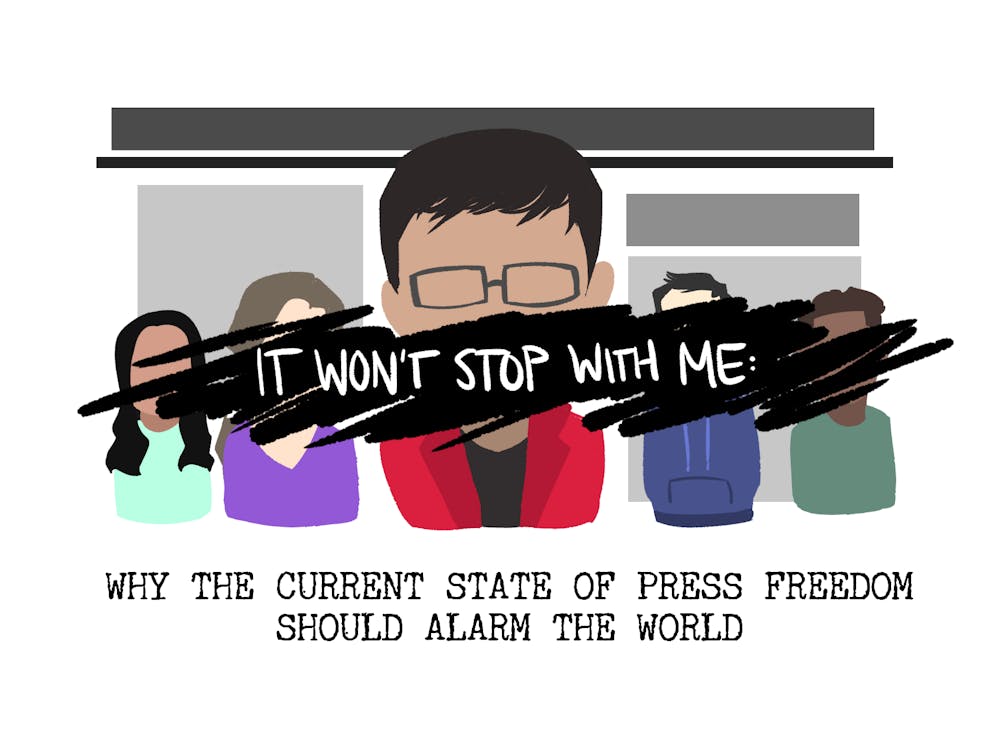On Thursday, Oct. 22, Maria Ressa ’86, a 2018 Time Person of the Year and the University’s 2020 Baccalaureate speaker, joined three journalists for a panel discussion, hosted by the Press Freedom Defense Fund (PFDF) and attended by over 200 people, including many University alumni.
For several years, Ressa has endured political persecution in her home country of the Philippines, where the government of President Rodrigo Duterte has targeted her news organization, Rappler.
Most recently, Ressa and Rappler colleague Reynaldo Santos Jr. were convicted of “cyber libel,” a decision that many critics condemned as a blow to press freedom, on June 15. Ressa is appealing the decision.
During the panel, Ressa spoke about the legal battles she faces, the consequences of social media disinformation, and the intricacies of media regulation.
The event, titled “It Won’t Stop with Me: Why the Current State of Press Freedom Should Alarm the World,” also featured NPR News media correspondent David Folkenflik, editor-in-chief of The Intercept Betsy Reed, and director of PFDF Jim Risen.
PFDF is a subsidiary of First Look Media, which owns The Intercept.
As Risen explained at the webinar’s start, organizers hoped to raise awareness of the restrictions and attacks that journalists are facing — and how people can help. Unlike other journalists’ rights groups, which often focus on general media issues, PFDF provides legal funds to journalists and whistleblowers who face legal battles, like Ressa.
“It’s a part of the Press Freedom Defense’s mission to actually directly engage with individual journalists, rather than try to take a broader view that some other press freedom groups do, which is to only get involved in broad transparency issues,” he said.

The panelists agreed that journalism has arrived at a uniquely precarious inflection point, not only on account of authoritarian threats, but also because of the industry’s fragile business structure.
“We’re now in an environment in which journalism in the United States is under assault every day in ways that it never has been before,” Risen said. “At the same time that there’s been more targeting of journalists, the financial and economic outlook for journalism is worse than ever.”
Ressa, a dual citizen of the Philippines and the United States, explained that though the United States has stronger institutions than the Philippines, journalists in both countries face many of the same threats; institutions may just be “collapsing” faster in the Philippines.
In the Philippines, Ressa has faced 12 criminal arrest warrants, five cyber libel suits, and additional security fraud cases. Each charge, she believes, is meant to intimidate journalists — especially those critical of the Duterte regime — and bankrupt their news organizations.

Panelists said that government attacks on journalism have similarly exacerbated press freedom in the United States. Reed recalled that President Barack Obama invoked the 1917 Espionage Act against journalists nine times while in office — more than all his predecessors combined. In Reed’s mind, the Obama administration’s precedent paved the way for the Trump administration to do the same.
As government attacks on news media have increased recently, Folkenflik said that the press are at heightened risk. He cited violence directed against journalists and arrests made during this summer’s Black Lives Matter protests.
“I think what we’re seeing is death by a thousand cuts,” Ressa said. “You don’t quite realize how much you lose with each cut and you bleed out.”
Ressa’s phrase serves as the title of a PBS documentary, called “A Thousand Cuts,” which examines the Philippine government’s crackdown against Ressa. The film will premiere in Jan. 2021.
After Reed asked Ressa how she and her colleagues maintain a smile, Ressa admitted she suffers from PTSD inflicted by the persecution she has endured. In 2016, she brought in mental health counselors for the Rappler staff.
“You sink into a hole,” she said, “And then you come out after a certain period of time, you just realized you know this is meant to beat you down, and you are not going to get beaten down.”
Panelists also discussed social media’s political and social implications. Ressa said she feels that tech giants such as Facebook and Twitter have become the “gatekeepers” of information online. To the panelists, such corporate control poses a serious threat. Rather than being designed to provide news, they said, social media sites benefit from incendiary disinformation.
“The problem is that our entire information ecosystem has been turned upside down, because journalists are no longer the gatekeepers,” Ressa said. “Journalists all around the world have held the line. We’re doing our jobs. But the problem is you have to make sure that our audiences get the news.”

From upper left, clockwise: Betsy Reed, Editor-in-Chief of The Intercept, David Folkenflik, Media Correspondent at NPR News, and Maria Ressa ’86.
Marissa Michaels / The Daily Princetonian
Another issue facing journalists, according to Ressa, is the disconnect between technological industries and the journalism world.
“Journalists don’t understand the tech, and the tech people don’t understand what we do,” she said. “But inevitably, now tech is the gatekeeper, and journalists, we have to understand the tech to get our power back.”
The panelists acknowledged a lack of clear answers regarding which authorities or entities should regulate social media platforms and the content shared within them.
“I share a lot of concern about allowing the social media platforms or even the government to decide what kind of reporting is legitimate and allowed and what form isn’t,” Reed said.
Platforms such as Facebook and Twitter do not fall under the same media regulations as news organizations, even as they propagate both news and disinformation. While news organizations are legally obliged to authenticate stories, social media platforms have no such obligation, even though they spread information more widely.
One question referenced Section 230 of the Communications Decency Act, an executive order President Trump introduced to punish social media sites for restricting content. Folkenflik said he thinks the government should take some responsibility over social media platforms, but must tread carefully.
“I think that there should be a lot of attention from lawmakers and regulators to these platforms and to the effects of what happens,” Folkenflik said.
Ressa has continued to receive support from fellow alumni. Julia Hicks de Peyster ’86, secretary of their alumni class, has assisted efforts in the U.S. to help Ressa. Hicks de Peyster emphasized the importance of giving Ressa the chance to speak with American audiences.
Alumni have expressed support for Ressa on social media and through open letters. In July, 424 community members and alumni took out a full-page ad in The Washington Post, calling on the U.S. government to help Ressa after her cyber libel conviction. In the same month, the Princeton Filipino Community and the broader Filipino American student community wrote an op-ed supporting Ressa in The Daily Princetonian.
De Peyster said that alumni should exercise their professional leverage to help Ressa. She pointed to Peter Lichtenbaum ’86, who has provided Ressa pro bono legal aid.
“I think that it’s really important for Maria to have a platform back into the U.S. amongst her supporters,” Hicks de Peyster said, “so that she can speak freely about the associations between what she’s experiencing in the Philippines and what’s going on with social media and press freedom in the U.S., particularly as we get close to an election.”








